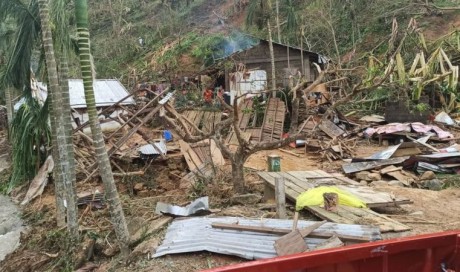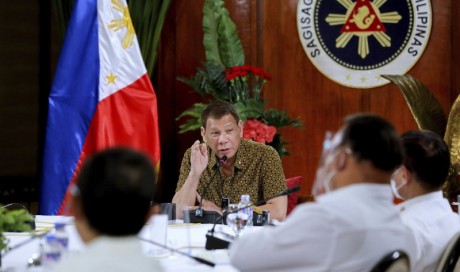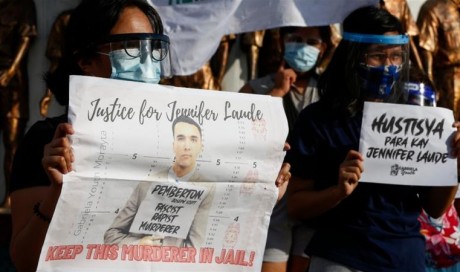While the Philippine government has tried to defuse tensions, the Kuwaitis have hardened their position.
“We hope that this development will not lead to further worsening of bilateral ties between the two countries,” Philippine presidential spokesman Harry Roque said in response to the rapid escalation of the diplomatic crisis. “We hope that…the passage of time will heal all wounds and will lead to normalized ties.”
The spiraling spat could torpedo the implementation of a bilateral Memorandum of Understanding (MOU), which aims to raise the pay and improve the protection for Filipino workers in Kuwait.

Philippine President Rodrigo Duterte (R) meeting Kuwaiti Ambassador to the Philippines Musaed Saleh Ahmad Althwaikh (L) at the presidential guest house in Davao City, in southern island of Mindanao. Photo: AFP/Arman Baylon
The agreement was supposed to be signed in coming weeks after Philippine President Rodrigo Duterte visited the Persian Gulf kingdom to personally oversee the MOU’s signing. Those plans are now on hold.
An earlier effort by Deterte to ease tensions by meeting the Kuwaiti envoy in Davao City on April 23 largely failed to turn the tide. So did the formal apology by Philippine Foreign Secretary Alan Peter Cayetano the following day.
“When we receive a call and they say, ‘I’ll be killed’ or ‘I’m in danger,’ action has to be swift, and action has to be given right away,” Cayetano explained while formally apologizing to the Kuwaiti government, people and leaders.
The vast majority of Filipinos working in Kuwait are underpaid and frequently abused with little protection under Kuwaiti laws, according to press reports.
While the Philippines received around US$33 billion in remittances from overseas Filipino workers (OFWs) last year, Kuwait accounted for only a small amount of that sum.
The World Bank has estimated that the impact of a potential total ban on OFW deployments to Kuwait would have a minimal impact on the Philippine economy.
Earlier this year, Duterte imposed a ban on new OFW deployments to Kuwait and repatriated hundreds of others after he accused its government of failing to protect Filipino workers against abuse and violence.
The surprise decision was prompted by the gruesome murder of Filipino Joanna Daniela Demafelis, the domestic worker whose tortured body was found in a freezer. News of the gruesome killing triggered a nationwide uproar across the Philippines.

Overseas Filipino Workers (OFW) from Kuwait gather upon arrival at the Ninoy Aquino International Airport in Pasay city, Metro Manila, February 21, 2018. Photo: Reuters/Romeo Ranoco
Duterte, who counts the OFW community in the Middle East and beyond as among his key constituencies, has also threatened to repatriate as many as 200,000 Filipino guest workers if Demafelis’ perpetrators weren’t brought to justice and overall working conditions weren’t improved.
The Filipino president was emotionally moved when informed that as many as 120 Filipino workers died in Kuwait in 2017, mainly due to abusive employers and dangerous working conditions.
An incensed Duterte lashed out at the Kuwaiti government. “When will this inhuman treatment of these Filipino workers end? Is there something wrong with your culture? Is there something wrong with your values?” he exclaimed, addressing the Kuwaiti nation in an emotionally charged speech in February.
It wasn’t the first time, however, that the Philippines has taken drastic measures to secure the safety of its millions of overseas citizens. In 2014, at the height of the Libyan civil war, Manila repatriated close to 12,000 Filipinos who were working in the war-ravaged nation.
Future rescue missions of endangered OFWs, however, are in doubt. Some are now calling for the resignation of the Filipino officials involved in releasing the rescue video, likely as a publicity stunt.
With that precedent set, government critics say, thousands of other distressed Filipinos are now likely beyond the reach of authorities as Kuwait and other Gulf states draw harder lines against the launch of such missions on their soil.
Share This Post














